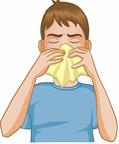Bird Flu, Pediatric
Avian influenza is also called bird flu. It's an infection caused by a germ called a virus. It's found in wild birds. It spreads easily among birds and is deadly to them. Birds and other animals can get bird flu from birds that are sick or from surfaces that have the germs on them. Bird flu can be spread from country to country when birds migrate or when birds are sold around the world as food.
Bird flu can cause people to get very sick. This is rare. It's also rare for bird flu to spread from person to person. But it can happen if your child spends a lot of time with someone who's very sick with bird flu. Flu viruses can change, so there's a chance that bird flu could spread from person to person in the future.
What are the causes?
When birds get sick with bird flu, they can spread germs through:
Bird flu can then infect a child who:
Comes in contact with a sick bird and then touches their eyes, nose, or mouth. This can happen with a bird that's dead or alive.
Breathes in dust that has germs in it.
Touches surfaces that have germs on them.
What increases the risk?
Your child may be more likely to get bird flu if:
They come in close contact with birds.
They visit or live in a country where bird flu is common.
They eat raw or undercooked birds that have bird flu.
What are the signs or symptoms?
Common symptoms of bird flu include:
How is this diagnosed?
Bird flu may be diagnosed based on your child's symptoms, medical history, and an exam. Your child may also have tests. These may include:
How is this treated?
Bird flu may be treated with:
Your child may need to stay in the hospital. At the hospital, safety measures, called contact precautions, are taken to stop germs from spreading to others. This means:
Your child may stay in their own room away from others.
Health care workers may wear protective clothes, gloves, masks, and goggles when they care for your child.
Follow these instructions at home:
Activity
General instructions
-
Give your child over-the-counter and prescription medicines only as told by your child's provider.
-
Use a cool mist humidifier to add moisture to the air in your home. This can make it easier for your child to breathe.
-
Have your child drink enough fluid to keep their pee (urine) pale yellow.
How is this prevented?
- Make sure that your child:
Covers their mouth and nose when they cough or sneeze.
Washes their hands often with soap and water for at least 20 seconds. If soap and water aren't available, have them use hand sanitizer.
-
Keep your child home from school when they're sick. This can stop the spread of germs.
-
Have your child get the flu shot every year. The flu shot can't prevent bird flu, but it can lower the risk of getting sick with the human flu and bird flu at the same time.
-
Have your child avoid close contact with birds.
-
Do not let your child eat raw or undercooked birds.
-
If you think your child has been exposed to bird flu, ask their provider about antiviral medicines that can help prevent infection.
Contact a health care provider if:
-
Your child has new symptoms.
-
Your child's symptoms don't get better with treatment.
-
Your child's symptoms get worse.
This information is not intended to replace advice given to you by your health care provider. Make sure you discuss any questions you have with your health care provider.

